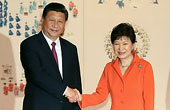Brazil beef exports to China face new hurdle
Updated: 2014-05-19 07:04
By JACK FREIFELDER in New York (China Daily USA)
Comments Print Mail Large Medium SmallMore than a year after China placed a ban on beef from Brazil due to an outbreak of mad cow disease, the country's Ministry of Agriculture has confirmed a second case of the illness.
Officials at a reference laboratory in Weybridge, England, one associated with the World Organisation for Animal Health (OIE), analyzed test samples from the infected animal and said that all features of the case in Brazil were indicative of an atypical case of mad cow.
Neri Geller, Brazil's Minister of Agriculture, Livestock and Food Supply, said all of the steps for handling this recent case were "followed to the letter".
"All of the actions foreseen in Brazil and abroad protocols … culminated with negative results, as was expected," Geller said in a statement on May 9.
Reuters reported in March that a delegation from Beijing was expected to visit Brazil beef-production facilities with an eye to lifting the 2012 ban and that shipments could resume before June, when Chinese President Xi Jinping is expected to meet with his Brazilian counterpart Dilma Rousseff at a summit of the BRICS bloc of emerging nations at Fortaleza, Brazil.
It is not clear how the new case will affect that outlook.
Based in Paris, the OIE is the intergovernmental body tagged with the responsibility of improving global animal health, and the group has close to 180 members — including both Brazil and China. All cases of mad cow are handed over to the OIE for analysis and examination.
Mad cow, or BSE (bovine spongiform encephalopathy), was first reported in the United Kingdom in the 1980s. In 2007, the UK Spongiform Encephalopathy Advisory Committee (SEAC) recognized atypical mad cow as a separate, distinct strain of the disease.
China banned the import of Brazilian beef in December 2012 in response to a case of mad cow disease reported in the southern state of Parana. A similar ban was put on US beef back in 2003, following a flare-up of mad cow disease reported in Washington State.
At the time of the ban in 2012, Brazil, which has an estimated 200 million head of cattle, was exporting beef directly to China at an average cost of $4,404 per ton.
However, since 2012 Brazil has been noticeably absent from the top-five list of beef exporters to China — a list that includes Australia, Uruguay, New Zealand, Canada and Argentina, according to the US Meat Export Federation (USMEF).
But China — one of the biggest meat consuming countries in the world — may allow beef imports from Brazil over the next five years in order to offset domestic issues in the red meat market.
According to the US Department of Agriculture attaché in Beijing, China's beef imports this year could reach 550,000 tons, up 38 percent from 400,000 tons in 2013
"The Chinese government is actively seeking solutions to solve the domestic supply shortage," Rabobank analyst Chenjun Pan wrote in a recent report entitled, China Beefing up Imports to Supplement Domestic Production.
"Even with the expected slight recovery of domestic beef supply, China is likely to open the door to Brazilian beef in the coming months," he said.
China's attitude toward opening markets to more countries has become more positive of late because the country's "gap in productivity is getting wider", the report says.
"To cover the supply gap, China will need to allow more beef imports, which are expected to increase by 15 percent to 20 percent each year for the coming five years, reaching 1.7 million tons by 2018," Pan said.
The report from Rabobank Group — an international financial service provider based in the Netherlands — sees the demand for beef in China outpacing production levels, which means officials will have to look outward for a remedy to the domestic shortfalls.
In response to domestic beef production issues, the Chinese government launched an initiative to support the beef industry in September 2013 and increase local production volume in the world's second largest economy.
The beef shortages in China have also caused prices to soar, increasing more than fivefold since 2000, according to the Rabobank report.
"It's not about approval as we already have the protocol to export to China," Andrea Bertolini, agricultural attaché at the Brazilian embassy told Reuters. "It's about re-opening the market. We really believe there are no technical reasons to keep this ban in place."
"The demand in China is real and we have a competitive product," she later told globalmeatnews.com.
James Robb, director of the US-based Livestock Marketing Information Center (LMIC) said that an "excess availability of pork" could render beef a "secondary item" in China's red meat market.
"[China] has lots of pork right now and I don't think that can be overstated, but the international trade is a dynamic," Robb said. "While I'd say there would be more potential for Brazil and the US, the most potential may be for Australia and some other countries."
Going forward, Robb highlights the issue of feed additives as a potential hang-up in any bilateral beef relationship with China. Ractopamine — a common feed additive — is one of the main culprits.
"Our suspicion is that China has taken a very strong stand on ractopamine with respect to pork," Robb said. "If China does open to beef, it will be required that … beef be ractopamine and beta agonist free. The bottom line is the Chinese have applied this ban in the pork context to a feed additive used in most of the world."
"To build demand in a foreign country is not just a matter of the US or Brazil offering product," he said. "It takes effort to do that, and it has to jibe with the actual on-the-ground logistics — which are not easy."





